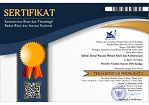Cigarette fatwas, contestation of religious authority and politics in Indonesia
Abstract
Keywords
Full Text:
PDFReferences
Al Bujairami, S. ibn M. ibn U. (1996). Al Bujairami ala Al Khathib, Tukhfatu al Habib ala Syarhi Al Khathib (Al Iqna Fi Halli Alfadhi Abi Syuja"). Daar Al Kutub al Ilmiyah.
Alqalyuby, S. A. ibnu A. ibn S. (1956). Hasyiyah ala Syarhi Jalalu al-Din Muhammad Ahmad Al Mahalli ala Minhaju al Thalibin (III). Musthafa Al Babi Al Halaby Press.
Bourdieu, P. (1996). Distinction, A Social Critique of The Judgement of Taste (viii). Harvard Uneversity Press.
Bourdieu, P. (1998). Practical Reason on the Theory of Action. Stanford University Press.
Brandt, A. M. (2007). Cigarette Century, The Rise, Fall, and Deadly Persistence of the Product That Defined America. Basic Book.
Burns, E. (2007). The Smoke of The God, A Social History of Tobacco. Temple University Press.
Douglas, M. (1966). Purity and Danger, an analysis of The Concepts of Pollution and Taboo. Routledge.
Eickelman, D. F., & Anderson, J. W. (2003). New Media in the Muslim World, Second Edition: The Emerging Public Sphere (Indiana Series in Middle East Studies). Indiana University Press.
Escobar, A. (1995). Encountering Development, The Making and unmaking of The third World. Princeton University Press.
Haryatmoko. (2016). Membongkar Rezim Kepastian Pemikiran Kritis Post-strukturalis. Kanisius.
Ibnu Al Shiddiq, A. A. H. I. M. (1985). Hukmu Al Dukhan Wa Thabah. Daar Al Bayan.
Nussbaum, M., & Sen, A. K. (Ed). (1993). The Quality of Life (Wider Studies in Development Economics). Clarendon Press.
Peterson, J. S. (t.t.). Defining Islam for The Egyptian State, Muftis and Fatwas of The Dar Al-Ifta. Social, Economic, and Political Studies of The Middle East and Asia, 59 Tahun 1997.
Porter, D. J. (2002). Managing Politics and Islam in Indonesia. Routledge Curzon.
Shaltut, M. (2001). Alfatwa, Dirasat Limusykilaati al Muslimi al Muashiri fi Hayatihi al Yaumiyyati wa al aammati (XVIII). Daar Al Syuruq.
Surjaman, T. (Ed.). (1991). Hukum Islam di Indonesia, Pemikiran dan Praktek. Remaja Rosda Karya.
Wahid, A. (ed). (2009). Ilusi Negara Islam, Ekspansi Gerakan Islam Transnasional di Indonesia. The Wahid Institute.
Wahid, H. (1999). Telikungan kapitalisme global dalam sejarah kebangsaan Indonesia. FK-GMNU. https://books.google.co.id/books?id=8uXsAAAAMAAJ
Zaman, M. Q. (2010). The Ulama in Contemporary Islam: Custodians of Change. Princeton University Press.
Artikel Jurnal
Agrama, H. A. (2010). Ethics, tradition, authority: Toward an anthropology of the fatwa. American Ethnologist, 37(1), 2–18. https://doi.org/10.1111/j.1548-1425.2010.01238.x
Gartman, D. (2002). Bourdieu’s Theory of Cultural Change: Explication, Application, Critique. Sociological Theory, American Sociological Association, 20-2 Juli 2002.
Hamid, M. A. (2017). Reinterpretation of Contemporary Islamic Law (Analysis Study of the Legal Fatwa of Smoking). Journal of Law, Policy and Globalization, Vol.61, 2017, 46–54.
Kaptein, N. J. (2004). The Voice of the ‘Ulamâ’: Fatwas and Religious Authority in Indonesia. Archives de sciences sociales des religions, vol.125 Januari-Mart 2004(Religious Authority In Indonesia), 115–130.
Masoud, M. K. (2009). The Significance of Istifta’ in the Fatwa Discourse*. Islamic Studies, Vol. 48:3 . 2009(03), 341–366.
Muhtarom, A. (2015). Meninjau Ulang Teori Qiyas (Kajian Terhadap Illat Dalam Qiyas Dan Upaya Pengembangan Teori Hukum Islam). Jurnal Al Ahwal, Vol. 7, No. 1 April 2015, 1–22.
Nashirudin, Muh. (2015). Ta’lil Al Ahkam dan Pembaruan Ushul Fikih. Jurnal Ahkam, Vol. XV, No. 1, Januari 2015, 21–26.
Pereira, L. C. B.-. (2012). Structuralist macroeconomics and the new developmentalism. Brazilian Journal of Political Economy, 32 No.02 Juli September 2012. http://www.scielo.br/scielo.php?pid=S0101-31572012000300001&script=sci_arttext
Saifuddin. (2014). Dinamika Otoritas Kharismatik Kiai dalam Proses Politik. Kasyf el Fikr, 1, Nomor 1, J uni 2014, 33–52.
Shareia, B. F. (2015). Theories of Development. International Journal of Language and Linguistics, Vol. 2, No. 1; March 2015.
Yakin, A. U. (2016). Fatwa KH. Ahmad Rifai Kalisalak tentang Opium dan Rokok di Jawa (Fatwa of KH. Ahmad Rifai Kalisalak on Opium and Smoking in the 19th Century Java). Jurnal Masyarakat dan Budaya, Vol. 18, no. 1/2016, 19–31.
DOI: https://doi.org/10.18326/ijtihad.v20i1.61-78
Refbacks
- There are currently no refbacks.

This work is licensed under a Creative Commons Attribution-ShareAlike 4.0 International License.
Ijtihad: Jurnal Wacana Hukum Islam dan Kemanusiaan by http://ijtihad.iainsalatiga.ac.id/ is licensed under a Creative Commons Attribution-ShareAlike 4.0 International License








